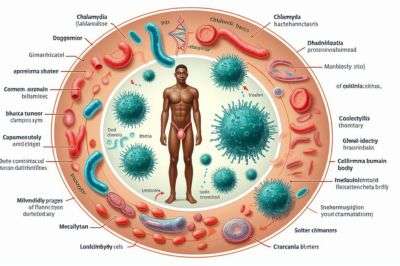Can Chlamydia Come Back? Understanding Recurrence, Reinfection and Prevention
Chlamydia is one of the most common sexually transmitted infections (STIs) worldwide, affecting millions of people each year. If you’ve been diagnosed and treated for chlamydia, you might be wondering: can chlamydia come back?
The short answer is yes, but there’s more to the story. In this comprehensive guide, we’ll explore the reasons behind chlamydia recurrence, how to prevent it, and what you need to know to protect your sexual health.

Table of Contents
ToggleUnderstanding Chlamydia
Before we dive into the specifics of chlamydia recurrence, let’s briefly review what chlamydia is and how it’s treated:
Chlamydia is a bacterial infection caused by Chlamydia trachomatis. It’s easily treatable with antibiotics, typically azithromycin or doxycycline. When caught early and treated properly, chlamydia can be cured without long-term health consequences.
Can Chlamydia Come Back After Treatment?
The answer to this question isn’t as straightforward as you might think. There are two main scenarios in which you might test positive for chlamydia after being treated:
1. Reinfection
2. Treatment failure
Let’s explore each of these in detail.
Reinfection: The Most Common Cause of Recurring Chlamydia
Reinfection occurs when you contract chlamydia again after being successfully treated. This is the most common reason for recurring chlamydia and can happen in several ways:
1. Untreated partner: If your sexual partner wasn’t treated along with you, they could reinfect you when you resume sexual activity.
2. New partner: Engaging in unprotected sex with a new partner who has chlamydia can lead to reinfection.
3. Multiple partners: Having multiple sexual partners increases your risk of exposure and reinfection.
According to the Centers for Disease Control and Prevention (CDC), the reinfection rate for chlamydia is significant. Up to 13% of women and 11% of men may become reinfected within a year of initial treatment.
Treatment Failure: A Less Common but Possible Scenario
While less common, treatment failure can occur for several reasons:
1. Incomplete treatment: Not finishing the full course of antibiotics can lead to incomplete eradication of the bacteria.
2. Antibiotic resistance: Though rare with chlamydia, some strains may be resistant to certain antibiotics.
3. Incorrect diagnosis: In some cases, symptoms similar to chlamydia might be caused by another infection, leading to ineffective treatment.
How Soon Can Chlamydia Come Back?
The timeline for chlamydia recurrence can vary:
1. Reinfection: This can occur as soon as you have unprotected sexual contact with an infected partner after your treatment.
2. Treatment failure: Symptoms may persist or return within a few weeks of treatment if the infection wasn’t fully cleared.
It’s important to note that you can get reinfected with chlamydia immediately after treatment if you have unprotected sex with an infected partner.
Preventing Chlamydia Recurrence
Taking proactive steps can significantly reduce your risk of chlamydia recurrence:
1. Complete treatment: Always finish the entire course of antibiotics as prescribed by your healthcare provider.
2. Partner treatment: Ensure all recent sexual partners are informed, tested, and treated if necessary.
3. Abstain during treatment: Avoid sexual activity until you and your partner(s) have completed treatment and any symptoms have resolved.
4. Practice safe sex: Consistently use barrier methods like condoms or dental dams during sexual activity.
5. Regular testing: Get screened for STIs regularly, especially if you have new or multiple partners.
6. Open communication: Discuss sexual health and STI status with partners before engaging in sexual activity.
7. Consider retesting: The CDC recommends retesting 3 months after treatment to ensure the infection has cleared and no reinfection has occurred.
Signs and Symptoms of Recurring Chlamydia
Recognizing the signs of recurring chlamydia is crucial for prompt treatment. Common symptoms include:
In women:
– Abnormal vaginal discharge
– Burning sensation during urination
– Pain during sexual intercourse
– Lower abdominal pain
– Irregular menstrual bleeding
In men:
– Clear or cloudy discharge from the penis
– Burning sensation during urination
– Testicular pain or swelling
Remember, many people with chlamydia don’t experience any symptoms. Regular testing is the only way to be certain of your status.
The Importance of Proper Treatment and Follow-up
Proper treatment and follow-up care are essential for preventing chlamydia recurrence and potential complications:
1. Take all prescribed medication: Complete the full course of antibiotics, even if symptoms improve before finishing.
2. Follow-up testing: Consider getting retested 3 months after treatment to ensure the infection has cleared.
3. Address any persistent symptoms: If symptoms persist after treatment, consult your healthcare provider promptly.
4. Regular check-ups: Maintain regular sexual health check-ups, especially if you’re sexually active with multiple partners.
Long-term Health Implications of Recurring Chlamydia
Repeated chlamydia infections can lead to serious health complications, particularly for women:
1. Pelvic Inflammatory Disease (PID): This can cause chronic pelvic pain and increase the risk of ectopic pregnancy.
2. Infertility: Untreated chlamydia can damage the fallopian tubes, potentially leading to infertility.
3. Increased risk of HIV: Chlamydia infection can increase susceptibility to HIV if exposed.
4. Reactive arthritis: In rare cases, chlamydia can trigger joint inflammation.
For men, recurring chlamydia can lead to epididymitis, a painful condition affecting the testicles that can result in infertility if left untreated.
Conclusion
While chlamydia can indeed come back, understanding the reasons behind its recurrence empowers you to take proactive steps in protecting your sexual health.
By practicing safe sex, ensuring proper treatment for both you and your partners, and maintaining open communication about sexual health, you can significantly reduce your risk of chlamydia recurrence.
Remember, regular testing and prompt treatment are key to preventing long-term health complications associated with recurring chlamydia infections.
Reference to External Sources:
[1] https://www.cdc.gov/std/chlamydia/stdfact-chlamydia.htm
[2] https://www.who.int/news-room/fact-sheets/detail/sexually-transmitted-infections-(stis)
[3] https://www.ncbi.nlm.nih.gov/pmc/articles/PMC3752995/
[4] https://www.mayoclinic.org/diseases-conditions/chlamydia/symptoms-causes/syc-20355349


